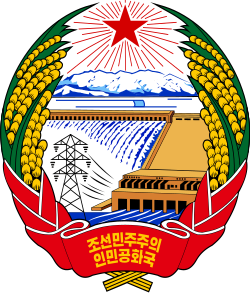For the de facto leader of North Korea, see Supreme Leader (North Korean title).
The following is a list of heads of state of North Korea since its foundation in 1948.
 |
|---|
The following is a list of heads of state of North Korea since its foundation in 1948.
For most of its existence, North Korea has not specified a formal head of state. The 1948 constitution did not define a head of state, but with regard to political functions usually performed by the head of state, the Chairman of the Standing Committee of the Supreme People's Assembly (SPA) could be considered one. Kim Il Sung was, at the time, as Premier, merely the head of government but not of state. As his position grew more stable, he wanted to be recognized as the head of state instead. Foreign admirers first started calling him such, and in the 1972 constitution his position was formalized as the President of the republic. [1]
After Kim Il Sung died in 1994, the presidency and hence the position of head of state was left vacant. While the late leader was titled the Eternal President of North Korea, the actual office of the President was written out of the constitution in 1998 making the head of state undefined again. His son and successor, Kim Jong Il, kept official titles given to him by the late president and never formally became the head of state. During this period, the president of the presidium of the SPA exercised many of the functions normally granted to a head of state, such as receiving ambassadors. Titles used by Kim Jong Un have constitutionally defined him as the Supreme Leader, but not formal head of state. [1] [2] However, amendments to the DPRK constitution in 2019 have granted the chairman of the State Affairs Commission (later renamed to president of the State Affairs), a title held by Kim, the status of representing the state and receiving and appointing ambassadors, effectively making him the head of state. [3]
| Portrait | Name (Birth–Death) | Term of office | Political party | Election | Supreme leader | |||
|---|---|---|---|---|---|---|---|---|
| Took office | Left office | Time in office | ||||||
| Chairman of the Standing Committee of the Supreme People's Assembly | ||||||||
 | Kim Tu-bong 김두봉 (1889–1958) | 9 September 1948 | 20 September 1957 | 9 years, 11 days | Workers' Party of North Korea | 1st SPA | Kim Il Sung | |
| Workers' Party of Korea | ||||||||
 | Choe Yong-gon 최용건 (1900–1976) | 20 September 1957 | 28 December 1972 | 15 years, 99 days | Korean Social Democratic Party | 2nd SPA 3rd SPA 4th SPA | ||
| Workers' Party of Korea | ||||||||
| President of the Democratic People's Republic of Korea | ||||||||
 | Kim Il Sung 김일성 (1912–1994) | 28 December 1972 | 8 July 1994 † | 21 years, 192 days | Workers' Party of Korea | 5th SPA 6th SPA 7th SPA 8th SPA 9th SPA | Himself | |
| Vacant (8 July 1994 – 5 September 1998) Yang Hyong-sop as Chairman of the SPA Standing Committee Kim Jong Il as supreme leader | ||||||||
| President of the Presidium of the Supreme People's Assembly | ||||||||
 | Kim Yong-nam 김영남 (1928–2025) | 5 September 1998 | 11 April 2019 | 20 years, 218 days | Workers' Party of Korea | 10th SPA 11th SPA 12th SPA 13th SPA | Kim Jong Il Kim Jong Un | |
| President of the State Affairs Commission | ||||||||
 | Kim Jong Un 김정은 (born 1984) | 11 April 2019 | Incumbent | 6 years, 272 days | Workers' Party of Korea | 14th SPA | Himself | |
